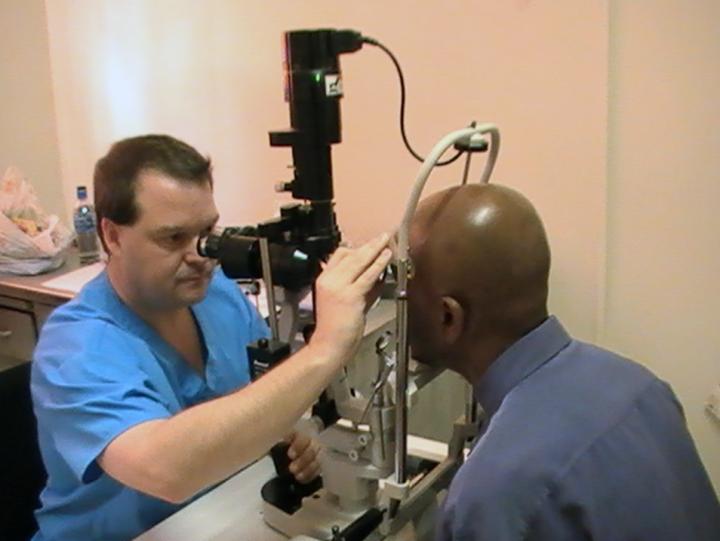
Credit: West Virginia University
Glaucoma is the leading cause of irreversible blindness in the world. The condition causes damage to the optic nerve resulting in slow, painless vision loss over many years. While there is no cure for glaucoma, most patients are able to avoid blindness by using eye drops one or more times a day to lower the elevated eye pressure responsible for the damage. But these drops have their challenges — they are often expensive and have side effects including eye irritation, stinging and chronic redness.
A new study to be conducted by the West Virginia University and the University of Pittsburgh seeks to change that. The National Eye Institute, part of the National Institutes of Health, recently awarded the universities $15.2 million to study how a treatment called selective laser trabeculoplasty (SLT) can be better used to treat glaucoma.
“Our hope is that a brief low-energy laser procedure performed in the office once a year will effectively lower eye pressure without the hassle, expense, and side effects of daily medical therapy,” said the study’s principal investigator Dr. Tony Realini, professor of ophthalmology and glaucoma specialist at WVU.
“The eye drops only work if you put them in every day, in some cases several times a day,” said Goundappa K. Balasubramani, research associate professor in the Pitt Graduate School of Public Health’s Department of Epidemiology. “Dozens of studies have taught us that most patients do not faithfully adhere to their medication regimen daily as prescribed.”
Like eye drops, SLT also treats glaucoma by lowering eye pressure, but the procedure may only need to be performed once a year, allowing patients freedom from a daily treatment regimen.
By identifying the best way to perform SLT to effectively manage glaucoma without eye drops, the researchers hope this study will change patients’ lives for the better. The study–a randomized clinical trial called “Clarifying the Optimal Application of SLT” or COAST–will compare standard SLT to low energy SLT and will also compare retreatment performed as needed when the effect wears off to retreatment annually to maintain eye pressure control without the need for medical therapy.
The researchers plan to enroll over 600 patients to receive treatment at up to 20 research centers. Patients will receive the laser treatment and their progress will be monitored over time. If the results of the trial are positive, the treatment plan for patients suffering from glaucoma could change for good.
“Our goal is to reduce the impact of this disease while improving patients’ quality of life,” said Stephen R. Wisniewski, professor of epidemiology and vice provost for Budget and Analytics at Pitt.
The WVU Eye Institute team (led by Realini) will oversee the clinical sites, and the University of Pittsburgh team (led by Wisniewski and Balasubramani) will be the trial’s data coordinating center. The research team also includes Dr. Michael Kass, professor and former chair of ophthalmology and visual sciences at Washington University in St. Louis and a renowned glaucoma specialist and researcher, Dr. Gus Gazzard, professor of ophthalmology at University College London who conducted a recent landmark SLT study in the United Kingdom, and Dr. Mark Latina, associate clinical professor of ophthalmology at Tufts University and inventor of SLT.
“If we validate an SLT treatment strategy that extends the duration of medication-free disease control, we move one step closer to the possibility of a drop-free lifetime for our patients,” Realini said.
###
Media Contact
Jake Stump
[email protected]
Original Source
https:/




